- Home
- Stewart Ferris
The Sphinx Scrolls
The Sphinx Scrolls Read online
THE SPHINX
SCROLLS
A Ballashiels Mystery
Stewart Ferris
Table of Contents
Title Page
The Sphinx Scrolls
Acknowledgements
Tuesday 4th September 2012
Friday 5th October 2012
Monday 19th November 2012
Tuesday 20th November 2012
Wednesday 21st November 2012
Thursday 22nd November 2012
Friday 23rd November 2012
Saturday 24th November 2012
Sunday 25th November 2012
Monday 26th November 2012
Tuesday 27th November 2012
Wednesday 28th November 2012
Thursday 29th November 2012
Friday 30th November 2012
Saturday 1st December 2012
Sunday 2nd December 2012
Monday 3rd December 2012
Tuesday 4th December 2012
Wednesday 5th December 2012
Thursday 6th December 2012
Thursday 20th December 2012
Saturday 22nd December 2012
An ancient Mayan prophecy...
A dangerous Nazi descendant...
A passionate archaeologist...
And an aristocrat desperate for cash.
* * *
Mayan legends tell of a location where the secret to surviving the end of the world may be found. One part of that legend is recorded on a stone tablet in the dusty attic of Lord ‘Ratty’ Ballashiels’s crumbling manor. The other twin part disappeared from a Berlin museum when the Nazis took power. When Ratty seems about to sell his tablet to the adopted son of Josef Mengele, his friend, the archaeologist, Ruby Towers, is appalled.
* * *
Soon it is clear that more than archaeology is at stake. The quest to rescue historic Central American artefacts becomes a race to prevent an apocalyptic threat when Ruby discovers that the ancients have set in motion something that will threaten the world today.
For Colin
Acknowledgements
When a novel gestates for twenty years between the initial spark of inspiration and its eventual publication, inevitably many people will have contributed towards the help, advice, feedback, ideas, nagging, sympathy, moral support, encouragement and cups of tea required to complete the project. So, with apologies to those left out simply because two decades is too long to remember everyone who may have played a part in this process, I wish to thank: Amanda Byfield for providing the glass of port that fuelled the first page of the first draft; Alastair Williams and Tim Bates for invaluable advice and feedback; Christophe Helmke for giving me first-hand experience of a Mayan archaeological dig; Dorie Simmonds for her infinite patience in waiting ten years for a first draft; Lynn Picknett for the priceless edits and suggestions without which Ratty would not have been let loose upon the world; my parents, without whom I wouldn’t have been let loose upon the world; the staff and postgraduate students at Surrey University’s Creative Writing department; and Penny Hunter, Rebecca Lloyd and Hazel Cushion for believing in this book and turning a twenty-year dream into reality. Finally, the biggest thank you goes to my wife Katia, who has done more than anyone to support, aid and inspire me to make this book happen.
‘A ... record of the first destruction, and the changes that took place in the land ... falls between the paws of the Sphinx’
Edgar Cayce, 1933
Tuesday 4th September 2012
Abrasive dust filled the rough-hewn tunnel. Dr Ruby Towers called for a vacuum hose and held a protective mask to her mouth. Now she knew why her team members had complained so vehemently about cutting into limestone in that confined space. After each ten minute shift they would come out of the passage shaking and coughing. So she had taken her turn, enduring the same deafening roar, the same choking heat as the rest of them. And she had been the one to break through.
She dropped the drill and wiped the grit from her goggles. Her pulse raced. After months of planning and overcoming bureaucratic hurdles, after weeks of scanning, measuring and arguing, and after days of gruelling tunnelling, this was her moment.
She poked her scuffed aluminium Maglite into the opening. Her eyes struggled to focus beyond the whirling particles picked out by the torch. It was frustrating, but the mere presence of airborne dust thrilled her. It signified an end to the section of rock. She ripped off the mask and goggles and waited for the cloud to dissipate. Now she could see her prize.
A chamber.
The space was cramped, smaller in dimension than some of the individual blocks used on the nearby pyramids. Objects were stacked in the centre of this timeless cavity. She counted them. Ten. They were clay tubes, just a few inches in diameter and no more than two feet in length. All were greyed by immense antiquity.
Was this the fabled Hall of Records? Was this the repository of the knowledge of a lost civilisation? Would this discovery finally unravel the mystery of the age and purpose of the Great Sphinx of Giza?
‘Can we get the camera in here?’ she shouted over her shoulder.
The documentary cameraman and the presenter squeezed alongside her in the narrow shaft. The cameraman pointed the lens at the presenter, former soldier Matt Mountebank.
‘So tell us what you’ve found,’ he said, with calm authority in his Manhattan accent.
The camera swung round to Ruby’s face, almost pressing against her nose.
‘We’re directly beneath the flank of the Sphinx,’ she announced, her voice excited and high pitched. ‘This tunnel was begun a century ago by tomb robbers using explosives. Our scanners revealed a chamber just ahead, so we applied for permission to extend the tunnel to join up with that chamber. That way there will be no external damage to the monument. And now –’
She paused. Matt was pulling faces at her from behind the camera. As usual. She kicked him in the leg with her heavy Altberg boot.
He stopped.
‘And now we’re through,’ she continued. ‘This peephole is enough to prove that the Sphinx houses an archaeological treasure. The clay tubes will almost certainly contain scrolls. If they are intact and readable, the ancient riddle of the Sphinx could be solved. We might be about to find out who built it, when they did so, and why.’
‘Turn off the camera. Everyone out.’
Ruby turned around. The Head of Antiquities was silhouetted in the tunnel entrance, flanked by two police officers. Dr Shepsit Ibrahim did not appear to share Ruby’s enthusiasm for the discovery.
‘Keep rolling,’ whispered Matt. ‘This could be good.’
‘Your licence has been revoked,’ shouted Dr Ibrahim. ‘This dig is finished.’
‘You’ve got to be kidding, Shepsit!’ protested Ruby. ‘We’ve been working towards this for months. I’ve found the chamber. I can see there are clay tubes in there. I can probably pull them out without even widening the hole. We can’t stop now!’
‘I’m sorry, Ruby,’ Ibrahim replied, her tone softening.
‘But you’re in charge, Shepsit. You can overrule this and get our licence back.’
‘I’m the one stopping it, Ruby. It’s over.’
Ruby felt as if she had been punched in the stomach.
‘What about Cambridge? All those nights we stayed up, solving the problems of the world, dreaming of making discoveries like this. Doesn’t that mean anything to you?’
Passionate tears began carving their way through the dust on Ruby’s cheeks. Ibrahim’s head bowed and she said nothing.
Ruby resisted the overpowering urge to slap her former college roommate as she stepped outside, police escort or not. In the unforgiving daylight, the two policemen seemed odd. Their uniforms didn’t fit, and neither did t
heir features: more Central American than Middle Eastern. She grudgingly acknowledged them in her limited Arabic and received no response. They remained curiously clamped to Ibrahim’s side.
‘What’s got into you, Shepsit?’ Ruby pleaded. ‘And why are the police involved? This doesn’t make any sense.’
Dr Ibrahim rolled her eyes sideways, left and right. Ruby followed her gaze and looked at the police officers again. They seemed edgy. As they turned she noticed one of them was pressing something firmly into Ibrahim’s back beneath a small rag.
A pistol.
Ruby glanced at Matt, fearing that his special forces training might tempt him to play the hero. His Gulf War memoirs were legendary. He was not a man to mess with.
‘Don’t try anything stupid,’ she grunted. ‘I don’t want Shepsit hurt.’
‘Sure,’ he replied, surprising her with his willingness to concede defeat. The ex-warrior began to walk away from the site with the rest of her despondent team.
‘Is that it, Matt? You’re not going to do anything?’
‘You just told me not to.’
‘I know, but you must have some trick you can use to overpower them?’
‘Rubes, those guys have guns. I got a damn microphone.’
Ruby stomped after him. More blatantly fake policemen had gathered at the perimeter, ushering people from the scene and clearing the way for their forthcoming escape. She stopped and glanced back at the Sphinx. It had survived Napoleon’s soldiers using it for target practice. It had foiled tomb robbers for millennia. Now, dwarfed by the grandeur of the Pyramid of Khafre behind it, the Sphinx stared forward with serene nobility while thieves dressed in police uniforms plundered priceless secrets from its heart.
Friday 5thOctober 2012
The turret room. Dark and disorderly. A sanctum of clutter. Nowhere could be better suited to the task of concealment.
The pace at which he scaled the tower’s dizzying steps was out of proportion to his paltry level of fitness, all the more so considering the additional effort required to lug the artefact. He stumbled into the room and steadied himself against a cluster of broken Hepplewhite chairs, gulping stale air, scanning his surroundings: above, an ornate ceiling stained by his failure to repair the turret roof; right, Grinling Gibbons wall carvings, home to a colony of unappreciative woodworm; ahead, Regency chests of drawers stacked haphazardly; left, a sofa that reputedly once supported the grateful behind of Edward VII; everywhere else, tea chests, piles of books, papers and paintings, all illuminated by the muddy glow of windows caked with seven centuries of grime. This was the ideal place in which to lose the relic.
He opened a drawer. Too obvious. He looked behind a stack of portraits. Not enough space. Suddenly the suitability of the room was less apparent. Wherever he stashed it, she would stick her nose there sooner or later. He danced in panic, hugging the ancient piece of carved stone to his palpitating ribs. The door at the base of the spiral staircase slammed, sending a sinister echo up the steps to announce her impending arrival. He could now hear her clunky Altberg boots clomping closer to him. It was too much for him to process. The future of his home, his life, and his family tree depended on his ability to hide the stone stele.
The footsteps grew closer. The door handle twisted. The stele was still in his hands, decidedly unhidden. He glanced at the sofa.
‘Why didn’t you wait for me?’ puffed Ruby Towers.
‘Wanted to get a head start,’ he replied, stretching out his legs and settling into the seat, wondering how he could get rid of his unexpected and unwanted guest. ‘Can’t find the confounded thing anywhere, though.’
‘So rummage. I’m dying to see it. So is everyone at the museum.’
‘Bit of trouble in the leg department,’ he lied, knowing he needed to come up with something far more convincing. ‘You go ahead.’
She sensed an awkward tone in his voice. Almost as if he didn’t want her here today. Almost as if there was something more important in his life. There had never been anything in his life, important or otherwise. He was just Ratty being Ratty, she guessed.
‘How could you lose it?’ she asked him.
He braced himself as the horse-hair cushion beneath him sank lower in the frame under the combined weight of the stele and his backside.
‘You said it could be worth a few spondoolies, so I placed it somewhere safe.’
‘A few, but not a lot. The museum doesn’t have very deep pockets, Ratty. They were thinking more of a token payment to you, that’s all. So where did you put it?’
Here was a chance for him to tell her to mind her own business.
‘Not sure, my little duck-billed platypus. The old neurons don’t seem to want to talk to each other.’ He cursed silently at his inability to stem the flow of mindless platitudes.
‘You’ve forgotten? It was only a week ago that you said I could take it to London. I thought you were keen to find out what they would offer.’
‘Well it’s here somewhere,’ he told her in a tone that he considered to be cutting, but which went unnoticed. ‘I know it looks a tad harum-scarum, but it has all been organised and cleaned.’
‘Organised and cleaned?’ questioned Ruby, running a line through a layer of pearly dust with her finger.
‘Absolutely. Yes. By the sixth Earl.’
‘And which one are you?’
‘Eighth.’
‘Are we even in the right turret?’ Ruby sighed.
‘Certes, old coco plum,’ he babbled, utterly at a loss as to how to extricate his life from her. Rudeness to a house guest was, in his eyes, a crime akin to treason. Telling her to leave and reneging on his offer to let the museum assess the stele was like unravelling a millennium of social breeding. He reverted to his safety net of banality. ‘Had to close the other turret. Surveyor said it could fall down. Utter tommyrot, of course. They said that about the gamekeeper’s cottage.’
‘Part of the gamekeeper’s cottage did fall down. You told me at Cambridge.’
‘Quite, quite. Always wondered where he’d gone.’
Ruby began the task of sorting through the junk, tackling the job slowly and systematically as if it were an archaeological dig. But the joy that she normally experienced in excavating the past was absent today. Ratty was odd. His behaviour was noticeably weirder than usual.
‘Awfully sorry about that Sphinx business, by the way,’ he added.
‘Shepsit thinks the thieves had Spanish accents. But that’s all we have to go on. They disappeared before the real police could get there. At least no one was hurt.’
‘I always thought they were such good eggs.’
‘Eggs?’
‘The Spanish.’
‘Oh. Tell me more about what I’m looking for,’ she said, trying to get him to focus on the immediate problem.
‘A queer Mayan wotsit,’ he mumbled. ‘Part of two doodahs that could be fitted together to reveal some kind of thingummy.’
‘And in English, please?’
‘One of those intriguing johnnies that look like tombstones but aren’t. Mayan stone tablets. Like portable stelae. Half of a pair. But circular, like a giant ha’penny.’
The relic upon which he was so painfully seated was about eighteen inches in diameter, dark greenish-brown, inscribed around its edges with symbols and images. The flat side showed a pattern of seven dots. The other side of the stone – the side upon which he was unwisely perched – featured a fist-sized round protrusion in its centre, plainly intended to slot into something. All such details had been eagerly relayed to Ruby in last week’s telephone conversation.
So much had changed in that week.
‘I know what it looks like. I want to know its story. How it came into your possession.’
‘Great-great Uncle Bilbo –’ he began, shifting his position slightly and trying to prevent his eyes from watering.
‘Great-great Uncle who?’
‘Bilbo. Another Lord Ballashiels. Victorian explorer. Source of the Ni
le and all that. Pockets full of essentials. Quinine. For malaria, you know. It’s in tonic water. Good excuse to dilute it with gin. Worked. Didn’t get malaria once. Come to think of it, though, dropped dead of cirrhosis.’ He was talking drivel. He needed to focus. He needed her out of there.
Ruby sighed again. Ratty was hard work.
‘But he did last for a year or so somewhere around Belize, I think,’ continued Ratty. ‘Maybe Guatemala. Isn’t that where you’re tootling off to?’
‘You mean the UNESCO job? Haven’t decided whether to accept it yet.’
‘Be careful, old chum. They say there’s a civil war brewing.’
‘That’s why we need to help them protect their heritage. After what happened in Egypt this is more urgent than ever. Emergency archaeology. High-resolution three dimensional scans of every pyramid, statue and stele so we know what’s been lost in case the worst happens. Anyway, what did your great-great uncle get up to?’
‘Went a bit loopy by all accounts. Some savages ... is that what you call them these days, “savages”? It’s awfully confusing remembering which words cause offence. Anyway, these savages looked after him in the jungle. Or is it a rainforest? And he wrote about it in his diary, which is in that heap over there.’
Ruby picked up a tattered diary. Scrawled across the front in faded mauve ink were the words: ‘Bilbo de St Clair, his Diary. Private. KEEP OUT’.
‘How old was he, fourteen?’ she asked, flicking through it.
‘In some respects, yes. Younger as he got older, if you see what I mean? Quite potty at the end.’
‘And he was out there searching for the pair of stelae?’
‘The local savages told him not to. Sort of cursed. Something to do with the end of the world. Sounds fun, he thought. Who cares about the end of the world with a liver nine parts hobnail boot?’
‘Quite the adventurer, wasn’t he? You sure you’re descended from him?’
Ratty grinned and ran his bony, freckly hands through his oily hair. He was fully aware of the contrast between this exciting and dynamic ancestor and the pathetic specimen he had become. A trip to the further reaches of his own garden was a major expedition for Ratty – he couldn’t even contemplate what it must be like to set off into a real jungle equipped only with a hip flask, a stiff hat and an even stiffer upper lip. It humbled him to think that Bilbo had actually done something with his life.

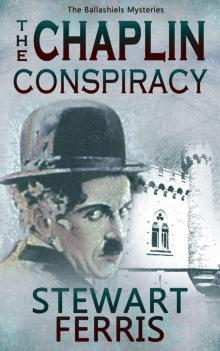 The Chaplin Conspiracy
The Chaplin Conspiracy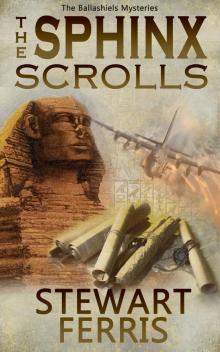 The Sphinx Scrolls
The Sphinx Scrolls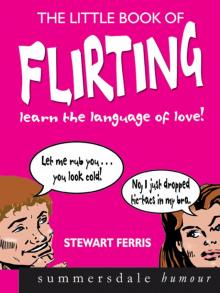 The Little Book of Flirting
The Little Book of Flirting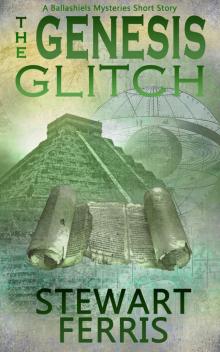 The Genesis Glitch
The Genesis Glitch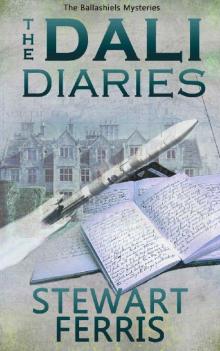 The Dali Diaries (The Ballashiels Mysteries Book 2)
The Dali Diaries (The Ballashiels Mysteries Book 2)